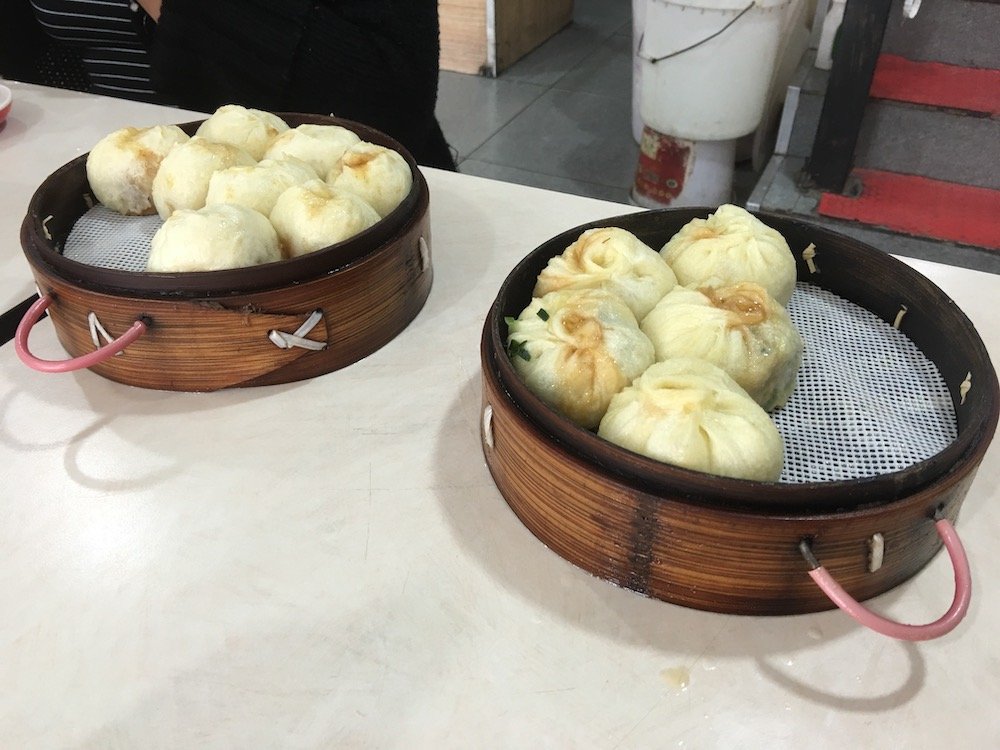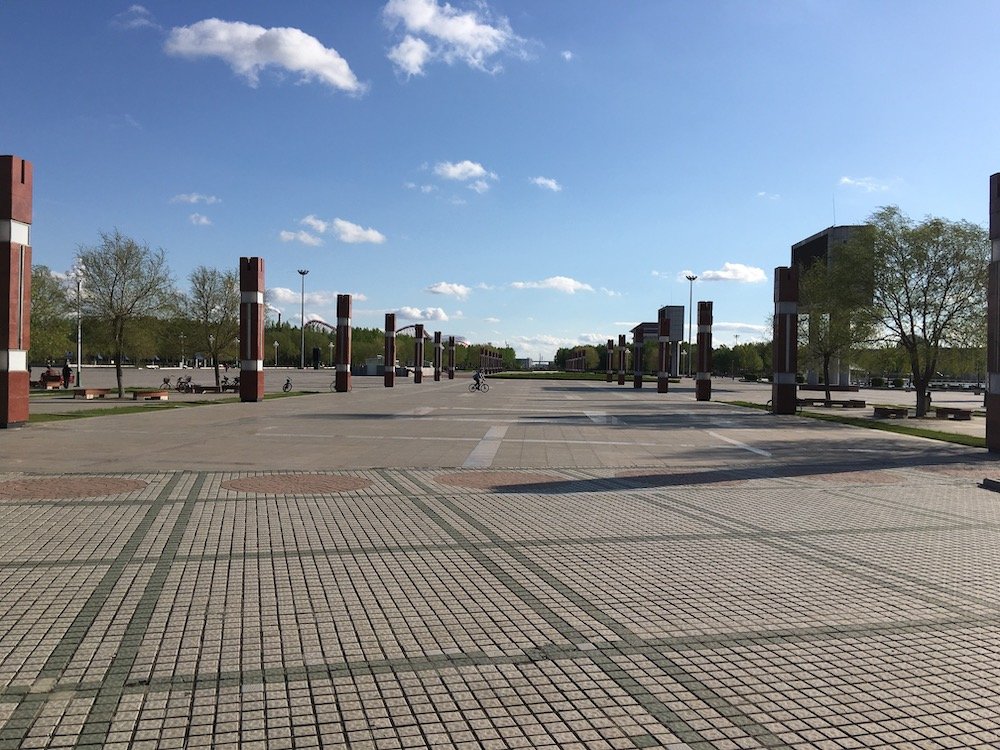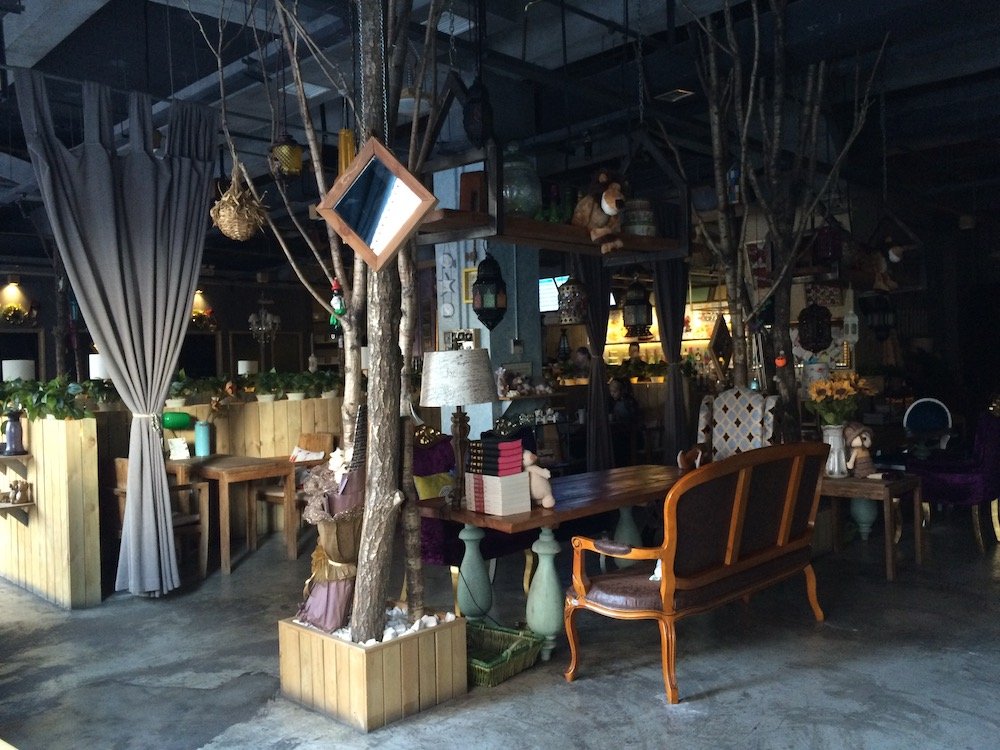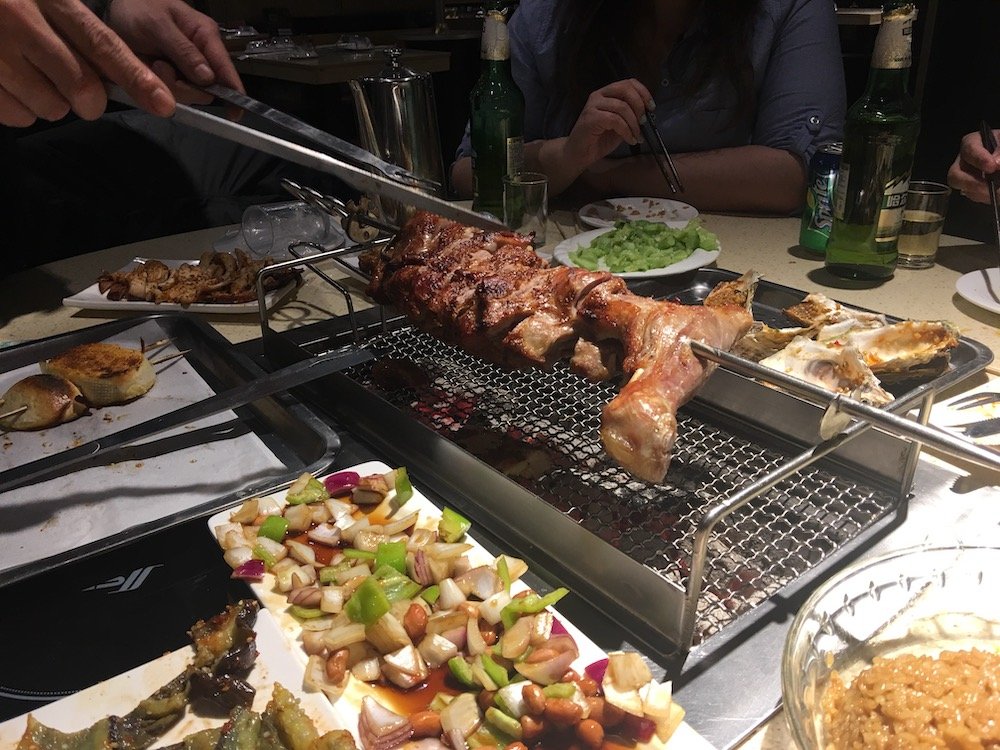A Day in the Life of a China Expat
My hometown in North Carolina is about a 15-minute drive from a population center in every direction. You start hearing a few cars go by around 7 am, then that tapers off into complete silence around 9:30. We have neighbors, but our houses have a not-insignificant amount of land between them. It’s unusual for me to see anyone I don’t recognize out and about. It’s a very quiet existence, especially when working from home. After a year of being home from China, this quiet reached a boiling point within me and I couldn’t really tolerate it anymore, or at least tolerate it and also be happy. Thus, I am back in chaotic China.
So, what’s the average day like in China then? Pretty much the complete polar opposite of my rural existence above. Something is always happening. People are always moving, whether by foot, car, or bus, and you have the accompanying noise of that surrounding you. It is the opposite extreme, and can be just as annoying after a while, but with it comes this electric feeling of kinetic energy from being surrounded by millions of people constantly moving about and chasing their motivations. I think I prefer the city. As I lie in bed thinking about these things, the chaos is increasing outside. It’s 8 am in Daqing, but the city’s already been awake for hours.
Steamed buns called baozi are a typical breakfast option in China.
Morning.
It’s Tuesday - one of my days off as an English teacher at a language training center. Our classes are private extracurriculars, so our busiest days are Friday, Saturday, and Sunday, when the kids have finished public school for the week. It’s weird at first, moving your weekend to Monday and Tuesday, but our little community revolves around those days. Sunday night is party night, Monday is hangover day and a write-off, and Tuesday is the day for reminding myself of why I’m here.
8 am is relatively early for what is essentially my Sunday, but I want baozi for breakfast, and all the good ones will be gone if I don’t force myself out of bed. It’s not far; I only halfway change out of my bedclothes and take the elevator down 20 floors, giving the old uncle smoking right next to the NO SMOKING sign the evil eye the whole way down.
The city is in full swing already with taxis rounding street corners at questionable speeds, stopping and beeping as they see me. It’s effectively an advertisement signaling, “Hey! You there! I’m free! Take my taxi!” This is normal when walking the streets of Daqing at all hours of the day. I don’t need a taxi so I give no response, and he continues on to the woman ahead of me who is walking in the same direction, blaring his advertisement. She doesn’t need a taxi either. Onward and BEEP BEEP. Onward and BEEP BEEP.
“Anything above 100 means I’ll be doing my exercise inside next to my air purifier.”
Fresh baozi are steaming outside the restaurant inside stackable metal cylinders. That’s always a good sign. The old ladies working there know me well by now and we chat as they bag up my normal order. They ask the usual questions: if my wife will be joining me soon in Daqing; if we’re going to have kids yet; giggling amongst themselves when I say probably not yet.
Baozi is a ubiquitous breakfast staple in China - everything you need to start your morning, packaged in a fluffy steamed bun. There’s something for everyone, but I went with my usual 4 beef, 4 chives, and egg. I eat them out of the plastic bag with my hands like a barbarian in the comfort of my apartment while checking the Air Quality Index (AQI), something that determines how the rest of your day goes in China. It’s been humid lately, so it was hard to tell just by looking out the window.
42. Looks like the run is on after all. Anything above 100 means I’ll be doing my exercise inside next to my air purifier. When it gets really bad, even the gyms aren’t safe here. You can expect the indoor AQI of any big facility in the city to be half of what it is outside. I digest, stretch, and listen to the news to catch up on what’s happening back in the States.
I run or walk almost daily in Daqing's Times Square.
Thankfully, the best place to run in the city isn’t that far away. I jog down the side streets until I reach Wanbao Dajie, the massive highway that cuts through Saertu District, and wait patiently for a lull in the 6-lane chaos before quickly cutting across. On the other side is the entrance to the biggest park and green space in Daqing, Times Square. It’s essentially a massive monument to the city’s chapter of the Communist Party, a concrete expanse that begins in front of the district’s main government building and stretches outward for over a mile.
In the square itself, there are water jets that kids play in during the summer, little stalls to rent roller skates, old ladies dragon dancing, and two massive TV screens that blare the state media every evening. On one side of the square is Wanbao Lake. You can take a boardwalk all the way across or circumnavigate it on a paved path. On the other side is the park, which has a surprising amount of greenery and several different paths to take through it, most of which run the length of the square.
Over the years I’ve developed several different combinations of these paths to break up the monotony of basically running in the same park every day. It’s a cool morning, pretty much the perfect weather for running. I don’t see many other people despite the size of the park - it is their workday after all.
These $3 noodles are worth a trip across the city.
Afternoon.
By the time I cool off, stretch, and have a shower, I’m pretty ravenous again already. It’s noon anyway, so I might as well dive right into a big bowl of noodles. The best noodles in Daqing can be quite a controversial subject among both my foreign and Chinese friends, and my opinion adds its own bit of fire to the debate. One of the best bowls you can get here isn’t in some hidden, back-alley stall. Nope. They’re actually in the food court of a huge mall, which is also within walking distance of my apartment.
Xin Ma Te, or New Mart, is a massive chain of malls that are owned by the Dashang Group, which is in turn owned by one of the wealthiest men in China. If you’re lost in any given prefecture-level city in Northeast China, just tell a taxi “xīnmǎtè”, and you will be sure to arrive at a central point in town. It’s here in the 4th-floor food court that all sorts of budget culinary wonders can be had, including the hearty bowl of buckwheat noodles (qiáomài miàn) I’m after.
The ladies running the show behind the counter also know me fairly well, which isn’t too surprising as my wife and I are some of the only foreigners they get on the regular. I watch them do their work. One mans the noodle machine which cuts the dough and drops it into a metal drum of boiling water. When they’re done, she strains them with a big sieve and distributes them evenly into waiting bowls. This place always has a long line - no chance of them getting cold. The other lady’s job is to prepare those bowls before the noodles enter the equation. She tosses in bean sprouts, fresh onion, cilantro, soybeans, chili paste, soy sauce, and oil, then places them on the ledge to await the noodles. When your order’s up, they mix it all together and you’re good to go, all for a buck fifty. They never fail, and today’s batch was especially delicious thanks to the spice of the earlier run.
“It doesn’t matter which direction I look in, I’m making eye contact with someone.”
The food court consists of a massive communal area of several benches and tables that are surrounded by all the little food stalls. I decide to kill two birds with one stone and head to the supermarket on the lower level. I feel everyone’s eyes on me as I stand up and walk through the tables. It doesn’t matter which direction I look in, I’m making eye contact with someone. This is the life of being a foreigner in a small Chinese city, and it’s pointless to even come here if you can’t get used to this aspect of always being an object of curiosity.
The stares continue as I walk through the aisles with my basket, picking up a few essentials from the international foods section. Baozi is usually a treat for me. Typically I’m eating muesli, yogurt, and fruit in the mornings, so I’m replenishing my stores before the teaching week begins again. Fruit is my favorite part of shopping in China. It’s better if you’re going to an actual fruit market, but even the supermarket has a massive selection of everything you’re used to back home, as well as some exotic local stuff like dragonfruit, lychees, mangosteens, and of course, durian.
This eclectic decor is pretty typical of cafes in China.
I run the groceries back up to my apartment, put everything away, and prepare to start my second job. Because I’m only teaching around 25 hours a week, I have ample time to continue freelancing on the side. At the moment I’ve got a few copywriting projects and a pretty big web design project in the works. It’s been a lovely day so far and I’m feeling quite inspired, so I decide to head over to a local coffee place that’s right across the street from my apartment. I tend to focus better outside my home.
The place is called Ramble Coffee, and it is an eclectic yet very contrived imaging of what a Western hipster coffee shop might be from a Chinese person who has never left the country. Coffee culture is still in its infancy here, yet gaining massive popularity among the upper-middle class and the wealthy. The interior has a weird combination of rustic wooden and throne-like overstuffed chairs, any number of unrelated trinkets in every nook and cranny, and dead trees with more ornaments hanging from them. It’s the classic, buy-stuff-until-it-looks-good strategy that many bored, wealthy Chinese apply to their pet business projects.
The people here are lovely, and I have a good relationship with them as a regular visitor who brings in many fresh-off-the-plane laowai in need of a coffee fix that isn’t Starbucks. The coffee is maybe just slightly above that level, but the space is much quieter, and if you want the authentic Parisian café experience of being able to light up a smoke with your espresso, you can do that here. I very rarely smoke anymore thanks to my vape but sometimes I can’t resist a cheeky cig over coffee while I’m working. This happens to be such a time.
Before I know it, it's creeping up on 5:30 in the afternoon. I've also got a message on WeChat that I completely missed. It seems like this past Sunday wasn't as heavy as I expected. My good friend Dan and a few others want to meet up for dinner at a big favorite of the expats - what we refer to as simply the "lamb leg restaurant". When your character reading skills suck, a lot of things tend to get named that way. I don't think I've ever gotten an invite to this place and turned it down, and tonight is not going to be any different. I pack up and head back to the apartment, where I take care of a few mundane chores that I don't want to be doing in the middle of the workweek. The weather is still delightfully mild, sunny, and breezy, so I leave the windows open and get a small catnap on the sofa before making the journey to Daqing's other big district.
You can eat like a king on a pauper's budget in China.
Evening.
Classic. It's around 7:30 pm, and all of the eager taxi drivers from this morning are nowhere to be found. I slowly walk in the right direction, checking back behind me as I go. The city is starting to light up. China has a real thing for neon, and I'm talking about the tacky kitsch that looks like something out of Blade Runner on really polluted days. I actually secretly love it. It probably goes back to me living out in the country for so long with 2-story buildings being the highest in sight. Sometimes I do still catch myself looking up at the buildings around me...and I hear a loud BEEP from behind while doing so tonight.
Where are you going? Shi'ao Zhongxin in Ranghulu. 45 yuan. Too expensive! How about 30? Okay, hop in! That's about how it usually goes if you're traveling anywhere far by taxi. Ranghulu is about 25 minutes from where I live, and it would actually be more expensive to ask him to put the meter on like a boy scout. Negotiating is going to get you a far better rate. That's not always the case, but Daqing is fairly good when it comes to taxis. There is some leeway with the markup - I can tell if someone is just being a good businessman or if they're trying to take advantage of whitey. The latter doesn't happen as often as it does in Harbin for example, which is surprising considering how few foreigners live in Daqing. 30 yuan is pretty standard going to Ranghulu one-way. To put it in perspective, that's $4.70 for a 15-mile ride, which would easily be $35+ in New York. Fuck the bus.
As a foreigner, you do pay another price, unfortunately. People are curious, and nine times out of ten, the driver wants to chat. Nothing wrong with that. However, imagine having to do this every time you step in a cab for four years. Answering the same exact questions. Where are you from? Why are you in China? Do you like China? Can you eat Chinese food? What's your job in China? How much money do you earn? And so on. My driver is nice enough and I don't mind cycling through these for the umpteenth time. After a few minutes, he's satisfied, and I watch the outskirts of Sartu District crawl by.
Most of the sights on the way to Ranghulu are related to Daqing's oil. There are pumpjacks everywhere, even between apartment buildings. Between Sartu and Ranghulu, they are absolutely everywhere, their dark shadows nodding up and down. We pass the massive Kunlun offices, one of the major petrochemical companies here that raised up people that come from nothing and placed them squarely into the driver seat of an Audi. And as we arrive in Ranghulu, we pass the Iron Man Memorial and Museum, commemorating Wang Jinxi as a national hero whose contributions to the petroleum industry even earned the praise of Mao himself. But enough of that boring history stuff. It's time for lamb.
Shadow Gallery is an institution among thirsty expats in Daqing.
I happen to walk up to the restaurant just as the others are arriving, which is good because I don't want to miss out on the leg selection. See, that's the thing here. You choose an entire lamb leg, and it's barbecued on a spit right at your table. We order a box of the regional swill, good ole Harbin Beer. It's alright if it's cold, but cold beer is something you have to ask for specifically here. Chinese people have a strange phobia against drinking cold things as it screws with your qi. It's getting closer to summer being in full swing, so we are blessed with some ice-cold hapis to crack open and knock back as we wait for our lamb to reach maximum crispness.
Lamb is the main event, but this place has all the staples you will routinely see at a table full of foreigners. Food is so cheap here that we usually end up ordering enough appetizers to make up a meal in and of itself. Let's see - excuse laziness for omitting tones - we've got:
Pai huanggua - literally "smashed cucumber salad" mixed with chunks of garlic, salt, and a bit of rice wine vinegar
Tudou pian - pretty much house-cooked potato chips dusted in a homemade spice mix
Suan rong zheng shenghao - Garlic steamed oysters with spices and little rice noodles on top
Yu xiang qiezi - Eggplant that has been split in two, smashed, and barbecued with garlic, chili oil, and cilantro
Lao cu huasheng - Peanuts soaked in vinegar with freshly chopped onions and bell peppers
It's a night of good fun, perpetually munching, laughing, and ordering more rounds of our 2.5% ABV Harbin Beers. We're having so much fun, in fact, that the conversation turns to what time people have to be in for work tomorrow. It's a dangerous game to play, but Wednesdays are usually very light. I have literally one hour of class tomorrow and it's not until 3 pm. I decide I'm game if we want to move the party to somewhere else. I'm not feeling completely bonkers, so I posture and maneuver the conversation to an expat favorite on my side of the city: Shadow Gallery.
“This damn bar is like our home, and we are encouraged to treat it that way.”
Shadow Gallery began as a dream. I sat in the vacant office space with my friend Nick and the owner, Dalong, smoking Cuban cigars as he laid out his vision for the place. It's China - especially if you plan on doing business here, take every grand plan with a grain of salt. But, Dalong delivered. He quickly became one of my best friends in China and his bar quickly became the best in Daqing, at least as far as expats were concerned. It's small but not too small, we know everyone there, and it is usually the obvious choice for a low-key night of drinks. Not to mention, the beer selection is top-notch with world-class brews from all over the world.
This damn bar is like our home, and we are encouraged to treat it that way. Board games litter the shelves, there's a jailbroken Xbox 360 hooked up to the TV, and there's even a loft upstairs to escape the crowds on busier nights. Dalong's border collie, Lager, runs about seeking attention on a rare quiet night that he's allowed to be here. Now that he's all grown up, his tail is a scourge of destruction in a place where every surface is covered with expensive drinks and expensive glassware. We decide to bust out Cards Against Humanity, the game that we can all agree on that lasts as long as we want it to last. After all, it's very well suited to degenerates such as ourselves. The laughter and clinking of glasses continue in our home away from home, as we close off our "Sunday" on a note that makes us grateful that we all ended up in this Tier-3 city in middle-of-nowhere China.
Bet you wanna come to China now, right? ◉
Written by Seth Barham









